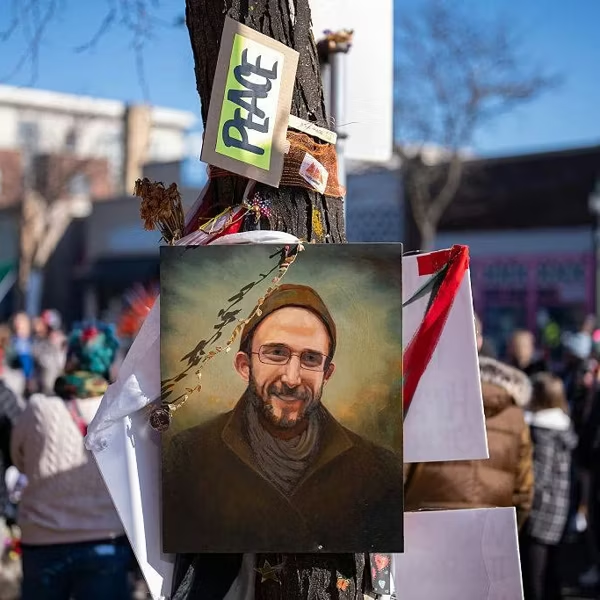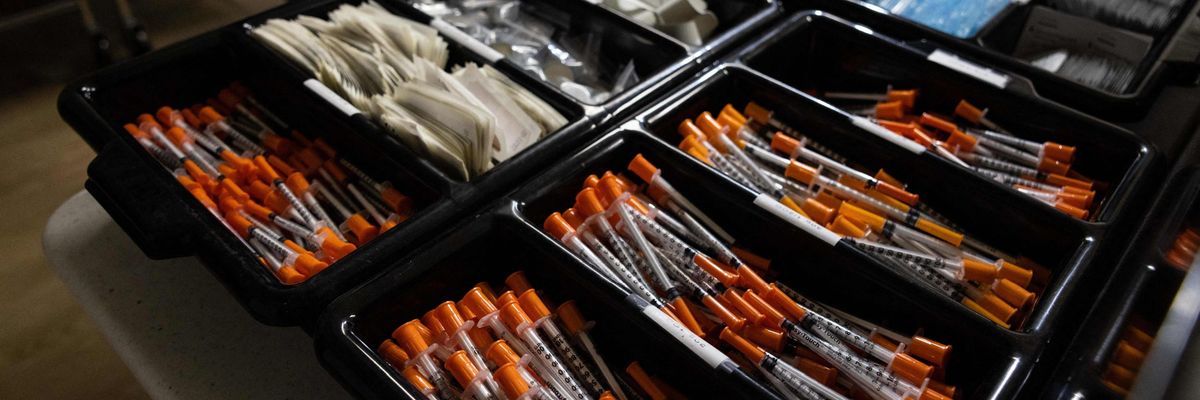According to an American Medical Association report released in mid-November, every state has seen a spike in overdose deaths from illicit drug use since the start of the COVID-19 pandemic, with approximately 90,000 people losing their lives in the first year alone.
Journalist Travis Lupick believes these deaths could have been prevented.
"It was the criminalization of drugs that created stigma. Stigma that discouraged drug users from seeking help for an addiction, and stigma that pushed people who used drugs into the shadows."
Most people don't die because they do drugs, he writes in Light Up the Night: America's Overdose Crisis and the Drug Users Fighting for Survival, but because they don't know what's in the drugs they're injecting.
"If illicit narcotics were legalized and regulated--perhaps similarly to how alcohol is today or through a more medicalized model--dealers wouldn't have the opportunity to mix fentanyl into the substances people use. Overdoses might still happen, but in far, far fewer numbers, and with significantly fewer deaths," he writes.
Lupick's assessment is drawn from hundreds of interviews with drug users and treatment specialists in the United States and Canada and serves as a call not only for decriminalization, but for the establishment of supervised injection sites so that users can be monitored by trained professionals. In this scenario, when an overdose takes place, the person is treated with Naloxone (also called Narcan), a powerful medication that causes immediate drug withdrawal, forestalling death.
Harm reduction--including supervised injection and the provision of clean needles to reduce the spread of HIV--are key public health tools, Lupick argues. Their efficacy is incontrovertible.
The result, as we now know, has been the exponential growth of mass incarceration, with about 20 percent of the 2.3 million people in state and federal prisons because of nonviolent drug offenses.
"Intravenous drug users have been shown to inject less frequently after they begin using a needle exchange, and are more likely to enter a detox facility, remain in drug treatment longer than those who never used an exchange, and are more likely to stop using intravenous drugs altogether," he writes.
This assertion is born of experience; Lupick has been writing about IV drug use since 2014. His first book, 2018's, Fighting for Space: How a Group of Drug Users Transformed One City's Struggle with Addiction, tracks Vancouver, British Columbia's user community and its efforts to support, maintain, and oversee supervised injection. And although he recently relocated to southern California, he is confident that what was learned in Canada can be transferred to the United States.
Jessica Tilley and Louise Vincent, both longtime intravenous drug users and political activists, are at the center of Light Up the Night and provide an in-depth look at the day-to-day impact of drug criminalization on individuals, families, and communities. Both began using as a way to self-medicate, Louise for bipolar disorder and Jessica as a way to block out the trauma of childhood sexual abuse.
But Lupick's narrative goes beyond personal accounts, delving into U.S. history to reveal the twisted genesis of the War on Drugs. The story he tells goes back to 1968, when Richard Nixon's presidential campaign sought to undermine the efficacy of two groups it considered domestic enemies: leftwing opponents of the Vietnam War and proponents of Black Power.
As Nixon's domestic policy advisor John Ehrlichman later told Harper's Magazine, Tricky Dick's campaign recognized that if they could sway the general public to "associate the hippies with marijuana and Blacks with heroin, and then criminalize both," the regime would be able to undermine public support for the social change these constituencies advocated. "We could arrest their leaders, raid their homes, break up their meetings, and vilify them night after night on the evening news," Ehrlichman said. "Did we know we were lying about the drugs? Of course we did."
The result, as we now know, has been the exponential growth of mass incarceration, with about 20 percent of the 2.3 million people in state and federal prisons because of nonviolent drug offenses.
Sadly, Lupick notes that prison does nothing to help those who are dealing with trauma. This is particularly galling, he writes, because for more than thirty years, researchers have known that adverse childhood experiences impact adult development. One study of more than 1,700 people revealed that "abuse, trauma that occurred years or even decades in the past, often led to significant changes later in life. If you were beaten or raped as a child . . . if you went hungry growing up, you were significantly more likely as an adult to experience clinical depression. . . . The strongest correlation was with a suicide attempt. The second was injection drug use."
Nonetheless, Lupick tells The Progressive that most proponents of the War on Drugs "do not deal with addiction as trauma or illness. You hear people say the right thing: 'Addiction is a disease,' but then they treat it as a police matter. It makes no sense."
Instead, he says, people need affordable trauma-informed therapy that does not force them to abstain from drugs while they are being treated.
Lupick presents intravenous drug users as complex beings who are far more than their addictions and zeroes in on their efforts to create supervised injection sites, needle exchanges, and the organizational infrastructure needed to boost their health and wellbeing.
Their efforts to form groups like the Urban Survivors Union and connect with the largely European-based International Network of People Who Use Drugs are both impressive and inspiring. While their efforts are currently largely remote due to COVID-19, they're also multidimensional, involving community engagement, education, outreach, and personal empowerment.
Not surprisingly, the Urban Survivors Union's agenda includes ending the War on Drugs, releasing those incarcerated for nonviolent drug offenses, and decriminalizing all narcotics.
Lupick considers the latter especially important.
"It was the criminalization of drugs that created stigma," he writes. "Stigma that discouraged drug users from seeking help for an addiction, lest friends and family learn of their problem, and stigma that pushed people who used drugs into the shadows, leading them to hide their drug use in basements and back alleys, where there is no one to respond in the event of an overdose."
In addition, the Urban Survivors Union is pushing for the repeal of "drug-induced-homicide laws" that have led to drug providers being charged with murder when unintentional overdoses occur. Likewise, they oppose policies that fine pharmacists for selling clean needles to those likely to inject drugs, in essence forcing users to share or reuse their works.
Thoroughly researched, provocative, concrete, and thoughtful, Light Up the Night should be required reading for anyone who wants to understand the reasons for overdose deaths. Of course, Lupick is not the first person to make these arguments, but this book reinforces the conclusion that the War on Drugs is futile.
Light Up the Night helps us envision alternatives in which addictions and their causes are addressed with care, compassion, and understanding.




